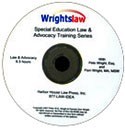pat howey- key differences between section 504 and IDEA
Section 504 Follows the Child, IDEA Does Not
When the child graduates from high school with a regular diploma or reaches the age of 22, the child's entitlement to rights under IDEA ends. IDEA rights do not follow the child into college or the workplace. Section 504 provides protections against discrimination after the child leaves public school.
Why disclose your disability? One reason is that your disability has influenced your approach to learning, your determination, and many other things in your life.
Unlike high schools, which are required to identify students with disabilities and accommodate them, colleges are required only to have the services available. It's up to the student to make the institution aware of his or her disability and ask for an accommodation.
|






